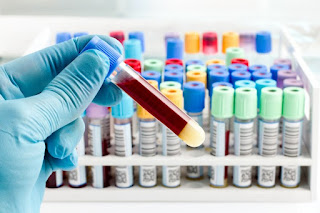ESR

ESR Erythrocyte Sedimentation Rate Methods: a. Wintrobes b. Westergren Vial : Lavender top ( EDTA ) Volume: 2 ml normal range: male 0 to 15 mm/hr female 0 to 20 mm/hr Theory: The RBCs sediment because their density is greater than that of plasma, resulting in their coming together to form large aggregates known as rouleaux . What is an ESR test used for? The ESR test can also be used to monitor infection and inflammatory diseases . The ESR test can be used to help your healthcare provider to diagnose conditions that cause inflammation, such as: Arthritis Systemic Vasculitis Inflammatory bowel disease Kidney diseases Infection Autoimmune diseases Heart diseases C ertain cancers https://solankipradeep0733.wixsite.com/bloodtests SEND MESSAGE Call: 95 8210 8290



